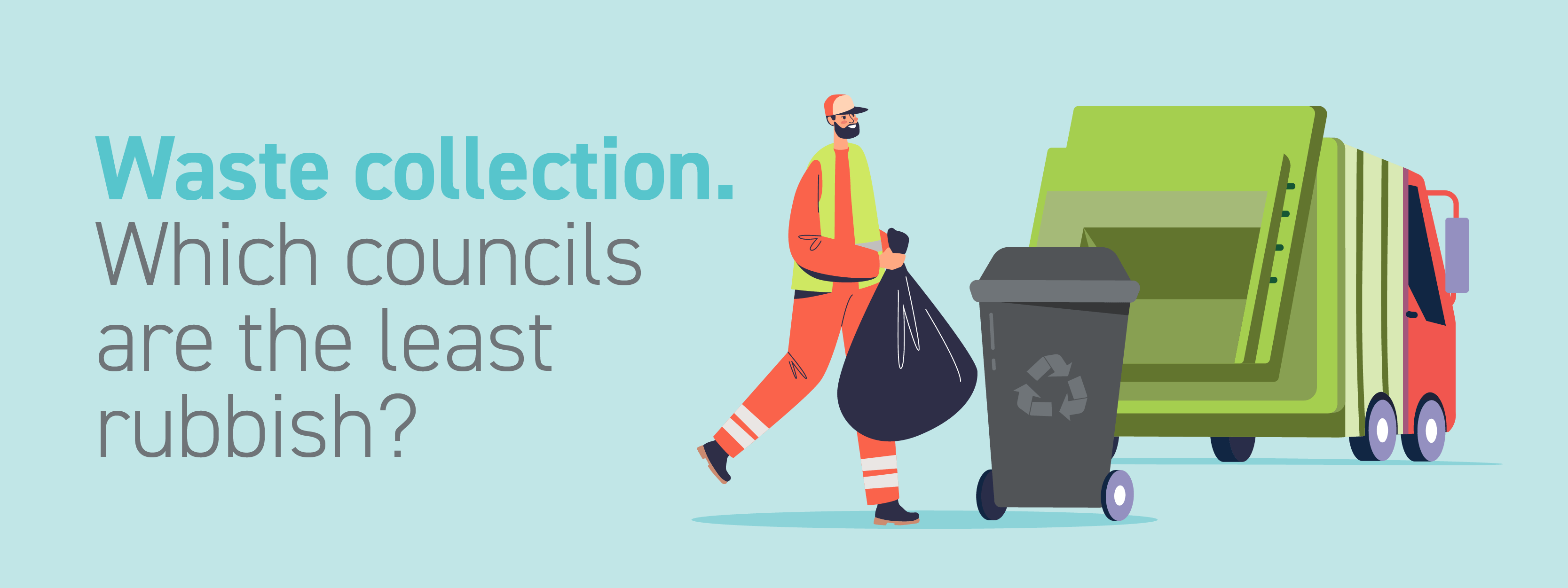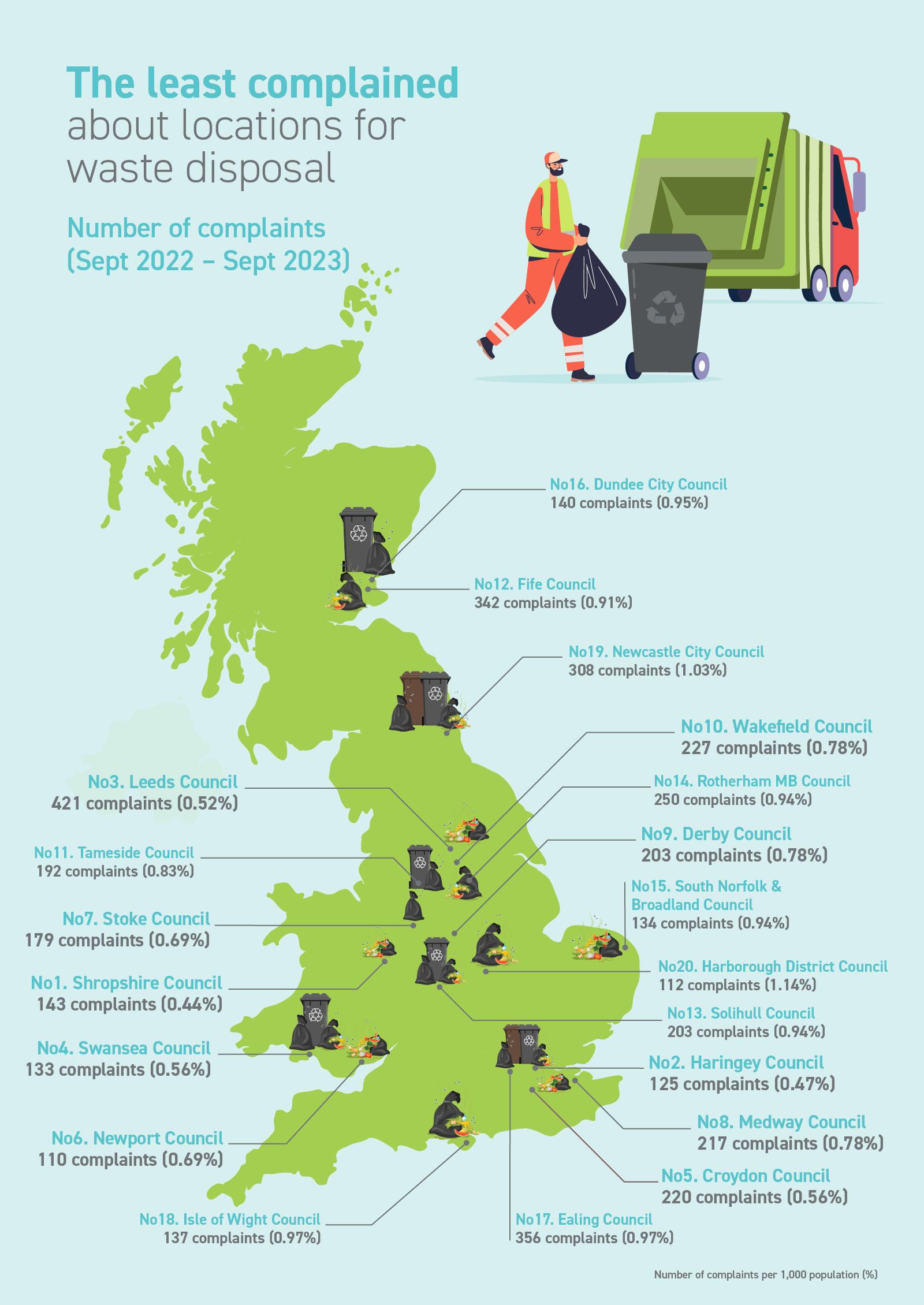How often do you think about waste collection? At Direct365, it’s always on our minds. That’s because providing efficient waste management solutions for businesses is one of our most popular and valued services. As small business experts, these services are never far from the front of our minds.
Most other people, however, only pay attention to rubbish when something goes wrong. Late, missed or incomplete bin collections are problems we all experience from time to time, regardless of whether we’re talking about domestic or commercial premises. But one thing that connects the two is when waste isn’t collected on time.
And for many, this is down to our local authorities. These types of errors happen more often than we’d like. What’s more, it’s something that is becoming more frequent.
In 2019, 1.8 million missed collection complaints were reported throughout the UK, rising by a third since 2014[1]. While it may be stark, it is easy to explain. Local authority budgets are increasingly under pressure and council spending on waste collections had fallen from £1 billion in 2010-11 to £888 million in 2017-18.
This feels like a serious and escalating problem, so we decided to investigate and gather more up-to-date statistics. In particular, we focused on which local authorities are the best and worst waste collection performers right now. Here’s a quick summary of the findings.
The questions we asked
Using Freedom of Information requests, we asked all 422 UK councils about the waste collection complaints they had received in the 12 months from September 2022 to September 2023. 65% responded. By covering a whole year, we were able to iron out any random fluctuations or seasonal variations—making the findings as representative as possible.
After filtering out incorrect or unreliable information, we had usable data from 100 councils throughout the UK, amounting to 211,189 complaints in total.
Which local authorities attracted the fewest complaints?
Salopians, it’s time to feel justly proud. The people have spoken in the most British of ways: by not moaning very much. Shropshire tops the table with a mere 0.44 waste collection complaints per thousand inhabitants. That’s just 0.07% of the nationwide total.
Haringey leads the way in London, coming second nationally. But from Leeds in third place to Derby at number nine and tenth-placed Wakefield, the entire top ten only received 0.78 complaints per thousand citizens. That adds up to just 0.96% of all complaints—a remarkable achievement, considering so many of the top ten are major towns and cities.
Which councils performed worst?
South Gloucestershire either has a lot of waste collection problems or a highly irritable population. 77.31 complaints per thousand people make it the worst performer of all the councils in the report. That’s a whopping 10.64% of the national total.
The full list of the ‘Tip Ten’ local authorities shows no regional bias. It ranges from Sevenoaks in Kent to Angus, north of the Tay. These ten councils are responsible for almost half (48.5%) of all the complaints we analysed. That’s an awful lot of missed or messed-up bin collections!
What’s everyone complaining about?
Turning from local authorities to the national picture, we next looked into which problems had drawn the most complaints. It’s no surprise that almost half of all the complaints were on one subject: missed collections.
This is an emotive issue. News stories about missed bin collections, often associated with strike action, tend to trigger headlines about rats running rampant and rubbish piling high in the streets. In September 2023, for example, it was reported that 1.5 million households around the UK were experiencing bin strikes, causing terrible smells and potential health hazards[2].
Related bin problems, grouped under ‘delivery and collection issues’, are also significant, although a long way behind. Other issues that are frequently mentioned include damage to bins and poor service quality. As we can see from the presence of ‘other’ and ‘unknown’ in the chart, poor waste collection service is like the rubbish itself: it comes in many forms and is sometimes hard to classify.
Which bin types draw the most complaints?
General refuse and recycling bins are the clear ‘winners’ here, with garden waste bins attracting far fewer complaints. The explanation may be that people are more concerned about general waste, and therefore more likely to contact the council when this type of rubbish isn’t regularly collected.
Understandably, however, complaints related to garden waste increase in the summer months when the nation’s lawn mowers and hedge trimmers are at their busiest. Garden waste collection complaints peaked in May 2023, but there were still only 687 across the 100 councils analysed.
In fact, complaints for all bin types rose in spring and summer, with over 8,000 complaints about faulty general waste collections in July ’23. This may be because uncollected and damaged wheelie bins are simply more noticeable when it stays light until late.
More positive news for businesses
Our research focuses mainly on domestic collections because the vast majority of properties are homes. This is undoubtedly serious news for households throughout the UK, who have no realistic alternative to their local council for rubbish collections.
If you run a business, however, there’s no need to be at the mercy of your cash-strapped local authority. At Direct365, we offer efficient, affordable and, above all, reliable waste management solutions for every type of commercial organisation.
Furthermore, the Direct365 team are always ready with helpful advice about waste disposal issues. Confused about what goes in which bin? Unsure whether items are recyclable? Puzzled by a specialist waste disposal problem? Check out our General Waste Disposal Service offering.
Sources
[1] Report revealing missed bin collections in the UK
[2] The councils affected by bin collection strikes in September 2023
Methodology
422 councils were approached and asked about complaints related to their waste collection. We asked for each complaint listed to include the date, category of complaint, bin type and collection type. After excluding the councils that failed to reply and those that provided incorrect data we had a list of 100 councils.
The data provided was then categorised. This categorisation method involves applying a formula to automatically classify complaints, bin types and collection types based on the presence of specific keywords or phrases. Each complaint is examined for a list of predefined keywords (see list below) corresponding to various complaint categories such as “Missed Collection”, “Billing and Charges”, “Service Quality”, and so forth.
When a keyword from the list is found within a complaint, it is assigned to the respective category. Each category has a hierarchy based on the order of conditions in the formula. If a complaint contains multiple keywords that could classify it into several categories, it will be assigned to the category corresponding to the first matching keyword found, based on the hierarchy within the formula. This approach ensures that each complaint is categorised based on the most prioritised or relevant keyword, providing a structured and organised classification system.



